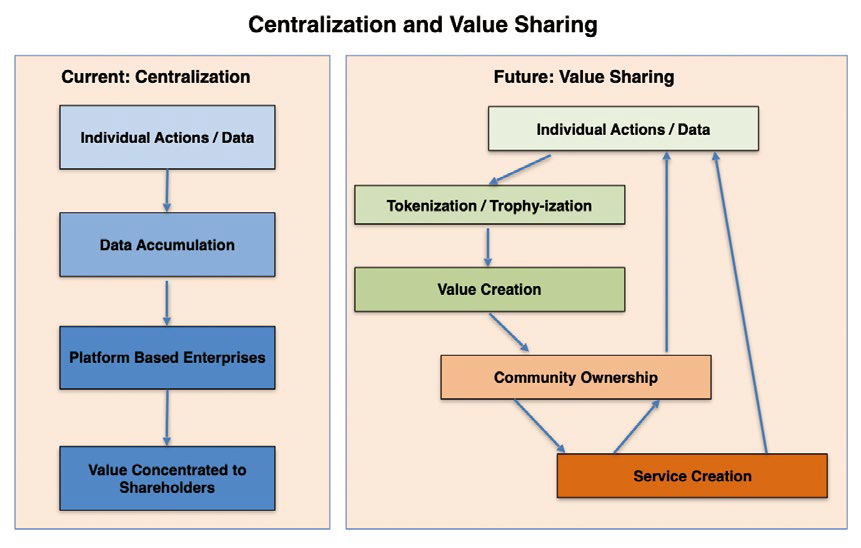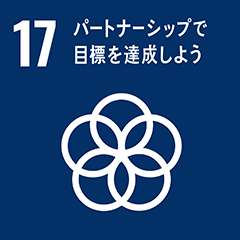Inochi Declaration
Create a society in which people engage in healthy dialogue—transcending isolation and fragmentation—by building a new cultural foundation for communication in the age of digital hyper-connectivity and algorithmic influence.
We now live in an era where our everyday actions generate value as data. Each individual instance—be it a purchase, time spent at a local shop, or participation in a community event—may seem trivial on its own. Yet, when aggregated and connected, such data can drive value creation in the form of behavioral prediction, demand generation, and regional revitalization.

Diagram: Value sharing via CyberTrophy
The value of this data grows exponentially as the number of users increases, serving as the core revenue source for platform-based enterprises. The joint-stock company model, born in the era of industrialization, distributes value according to contributions of labor and capital. However, it is not designed to accommodate the new kinds of value produced through data. Crucially, those who generate the data—individuals—rarely receive a fair share of that value. Instead, it is concentrated among capital providers in the form of shareholders. Moreover, vital contributions to society—such as community cleaning or helping others—often go unrecognized in existing systems.
In response to this challenge, Continuum Social Inc., in collaboration with The University of Osaka and the Senri Platform, has launched a test case in the Senri region. Utilizing “CyberTrophy”, a virtual system deployed across commercial facilities and public spaces, the project aims to tokenize (digitize) the value generated through people’s daily actions, making it visible and circulating it fairly within the community. This initiative connects diverse forms of social capital—ranging from everyday activities to disaster preparedness and cultural engagement—and explores new models of community building. Through the gradual implementation of value distribution and governance frameworks, the project in Senri is being developed as a template model that can be scaled horizontally to other communities (see diagram).
Unlike conventional centralized platforms, this initiative allows communities themselves to govern how value is assessed and distributed. Realizing such a system requires careful examination from three perspectives: technology, economics, and institutional frameworks. Technologically, the system will build upon existing blockchain and smart contract technologies, enabling customization according to local characteristics. Next, economically, the initiative prioritizes harmony with local economies, working in collaboration with shopping districts, financial institutions,ESG initiatives of businesses, and local government digital transformation policies. Then, institutionally, legal definitions around digital certification and taxation frameworks for value transfers must be clarified in consultation with relevant agencies. In addition to these initiatives, the governance of the entire system will prioritize openness—both in protocols and services—allowing participants to take active ownership in its development and evolution.
The initiative begins with basic implementation in commercial and public facilities, validating the processes of value creation based on behavior. Key challenges include (1) Maintaining sustained engagement from users, (2) Ensuring the reliability of data and (3) Establishing objective standards for evaluating value. Each of these issues will be addressed in turn. Success will be measured through indicators such as monthly active users, the volume of value created, and the economic impact on the local community. Through ongoing evaluation and refinement, the project seeks to foster an ecosystem in which community members take ownership of the system, supported by natural emergence of service providers. Each community can adapt this foundational model to its own local context, connecting loosely with others through shared principles, thereby co-creating a new, contemporary model of value circulation that is inclusive and regenerative.
The Inochi Forum, together with initiatives such as Continuum Social and other organizations, will build systems that make the creation and circulation of data-driven value more democratic and open, and will strive to realize a society where the value created by all is shared by all—a society in which every Inochi unleashes its radiant light.
[References]
・Continuum Social
https://www.continuum.social/
・A Novel Framework for Reputation-Based Systems
https://a16zcrypto.com/posts/article/reputation-based-systems/
・The Future of Work is Not Corporate — It’s DAOs and Crypto Networks
https://a16zcrypto.com/posts/article/the-future-of-work-daoscrypto-networks/
・Chris Dixon:Read Write Own Buildng the next era of the internet Read Write Own – Chris Dixon
・Jesse Walden : Fund Raising and Deal Structure Fundraising and Deal Structure – a16z crypto
・Scott Kominers:Everything Token
https://www.hbs.edu/faculty/Pages/profile.aspx?facId=500905
[Action Platform]
SDGs+Beyond
[SDGs]




